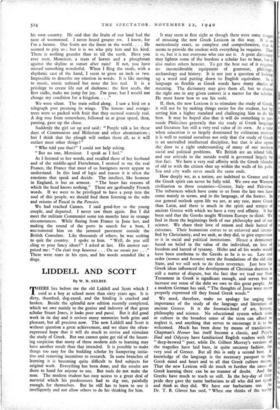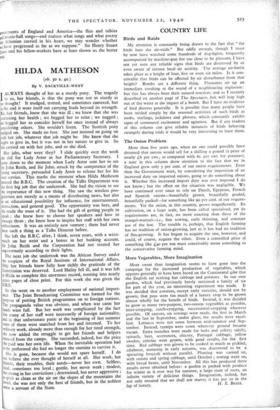LIDDELL AND SCOTT
By W. B. SELBIE
THERE lies before me the old Liddell and Scott which I used as a boy at school more than sixty years ago. It is dirty, thumbed, dog-eared, and the binding is cracked and broken. Beside the splendid new edition recently completed, which we owe mainly to the genius and industry of that great scholar Stuart Jones, it looks poor and passé. But it did good work in its day and it revives many memories both grim and pleasant, but all precious now. The new Liddell and Scott is without question a great achievement, and we share the often- expressed hope that it will do much to revive and stimulate the study of Greek. But one cannot quite get rid of the haunt- ing suspicion that many of these modern aids to learning may have another result than that intended. It is possible to make things too easy for the budding scholar by hampering initia- tive and removing incentives to research. In some branches of learning it is becoming quite difficult to find subjects for original work. Everything has been done, and the results are there to hand for anyone to use. But tools do not make the man. The modern student has easy access to a great deal of material which his predecessors had to dig out, painfully enough, for themselves. But he still has to learn to use it intelligently and not allow others to do his thinking for him. It may seem at first sight as though there were some danger of misusing the new Greek Lexicon in this way. It is so meticulously exact, so complete and comprehensive, that it seems to provide the student with everything he requires. That is so, but it is not everyone who can use it. A great dictionary may lighten some of the burdens a scholar has to bear, but it also makes others heavier. To get the best out of it requires no inconsiderable equipment of grammar, philology, archaeology and history. It is not just a question of looking up a word and putting down its English equivalent. In a language so flexible as Greek words have many shades of meaning. The dictionary may give them all, but to choose the right one in any given context is a matter for the scholar. He must know how to use his tools.
If, then, the new Lexicon is to stimulate the study of Greek, it will not be by making things easier for the student, but by setting him a higher standard and challenging him to do his best. It may be hoped also that it will do something to per- suade Philistines generally that the study of Greek language and literature has still a very real value of its own. At a time when education is so largely dominated by utilitarian motives it is well to remind ourselves not only that the study of Greek is an unrivalled intellectual discipline, but that it also opens the door to a right understanding of many of our modern social and political problems. We British are an island folk, and our attitude to the outside world is governed largely by that fact. We have a very real affinity with the Greek islander of old or with the citizen shut up within the walls of his polls. SI Sea and city walls serve much the same ends.
How deeply we, as a nation, are indebted to Greece and to the Greek spirit can never be fully told. We owe our Western e: civilisation to three countries—Greece, Italy and Palestine. th The influences which have come to us from the last two have th come mainly in terms, and in the language, of the former. In our general outlook upon life we are, at any rate, more Greek than Latin, and there is much in the spirit and temper of ancient Greece with which we have a very real affinity. It has been said that the Greeks taught Western Europe to think. We find in them the beginnings both of our philosophy and of our science. We share their love of reason and their hatred of extremes. Their humanism comes to us enlamed, and intensi- fied by Christianity, and we seek, as they did, to give expression to it in social and political institutions. Hence a democracy based on belief in the value of the individual, on love of freedom and hatred of tyranny. Hitler and all his works would have been anathema to the Greeks as he is to us. Law and order (nomos and kosmos) were the foundations of the old city State, and we still seek to do them reverence. Just how far Greek ideas influenced the development of Christian doctrine is still a matter of dispute, but the fact that we read our New Testament in Greek is significant enough, and serves but to increase our sense of the debt we owe to this great people. As a modern German has said, "The thoughts of Jesus were never properly expressed till they found Greek words."
We need, therefore, make no apology for urging the importance of the study of the language and literature of ancient Greece. It is the fountain-head of art, history, philosophy and science. No educational system which aims th at culture in the broadest sense of the term can afford to neglect it, and anything that serves to encourage it is to be welcomed. Much has been done by means of translations. Chapman's Homer has itself become a classic, and Pope's Iliad and Odyssey have familiarised English readers with the " deep-browed " poet, while Dr. Gilbert Murray's versions of the tragedies have laid bare, in quite uncanny fashion, the very soul of Greece. But all this is only a second best. A knowledge of the language is the necessary passport to the Greek mind and heart and to all that Greek culture means. That the new Lexicon will do much to further the cause of Greek learning there can be no manner of doubt. And the Greeks have much to teach us still. In the hey-day of their pride they gave the name barbarians to all who did not speak and think as they did. We have our barbarians too. AS Dr. T. R. Glover has said, "When one thinks of the trashy amusements of England and America—the flics and talkies and music-hall songs—and realises what songs and what poetry the Athenian carried in his heart, we may wonder whether we have progressed as far as we suppose." Sir Henry Stuart Jones and his fellow-workers have at least shown us the better tray.



























































 Previous page
Previous page